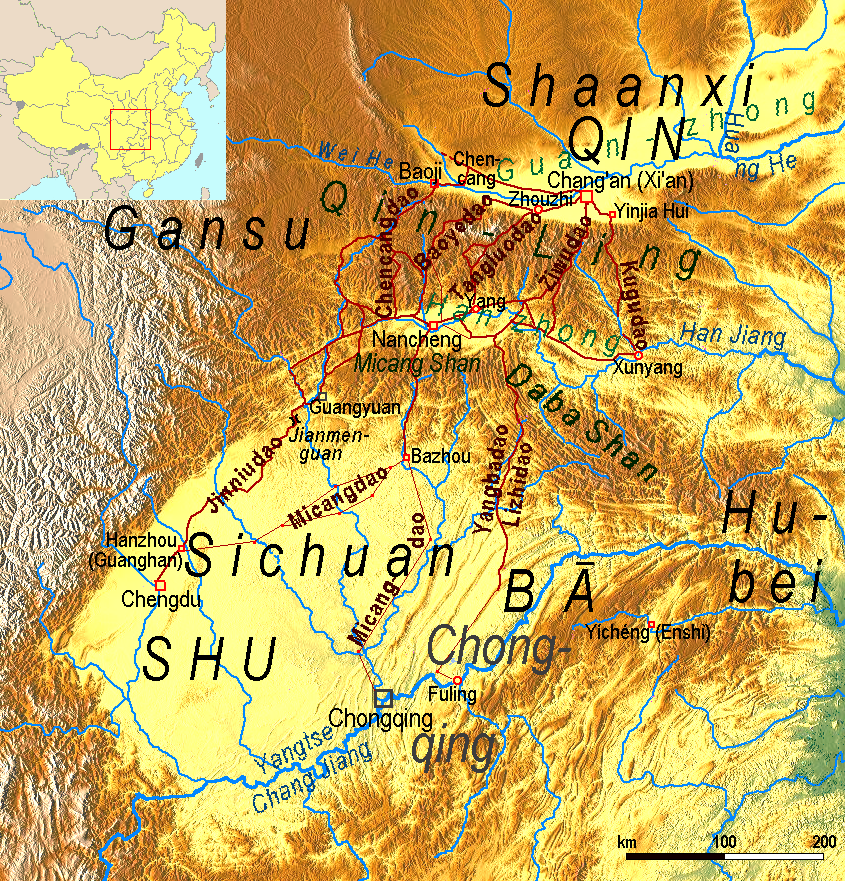Jianmen Pass on:
[Wikipedia]
[Google]
[Amazon]
Jianmen Pass () is a mountain pass located southwest of the city of
 The mountain pass was a part of the
The mountain pass was a part of the
Guangyuan
Guangyuan () is a prefecture-level city in Sichuan Province, China, bordering the provinces of Shaanxi to the northeast and Gansu to the northwest. The city has a population of 2,305,657 as of the 2020 census.
Located roughly between the provin ...
in Sichuan
Sichuan (; zh, c=, labels=no, ; zh, p=Sìchuān; alternatively romanized as Szechuan or Szechwan; formerly also referred to as "West China" or "Western China" by Protestant missions) is a province in Southwest China occupying most of the ...
province. It has also been called "Jianmenguan Pass"; however, that form is redundant since ''guan'' means "pass" in Chinese.
Location
Jianmen Pass is located inJiange County
Jiange County () is a county of Sichuan Province, China. It is under the administration of Guangyuan city. The history of Jiange County as a county division goes back around 1700 years. The county has historically been a junction between the nort ...
, Guangyuan City of Sichuan Province. The city of Chengdu
Chengdu (, ; Simplified Chinese characters, simplified Chinese: 成都; pinyin: ''Chéngdū''; Sichuanese dialects, Sichuanese pronunciation: , Standard Chinese pronunciation: ), Chinese postal romanization, alternatively Romanization of Chi ...
, which is the capital of Sichuan Province, is less than 200 kilometers south from there. The natural pass is formed by cliffs on the sides of mountains. The gate of the pass was built on the middle part of the Dajian Mountain as a strategic position.
History
 The mountain pass was a part of the
The mountain pass was a part of the Shu Roads
The Shudao (), or the Road(s) to Shu, is a system of mountain roads linking the Chinese province of Shaanxi with Sichuan (Shu), built and maintained since the 4th century BC. Technical highlights were the gallery roads, consisting of wooden plank ...
. The construction of the gate was related to the Three Kingdoms
The Three Kingdoms () from 220 to 280 AD was the tripartite division of China among the dynastic states of Cao Wei, Shu Han, and Eastern Wu. The Three Kingdoms period was preceded by the Han dynasty#Eastern Han, Eastern Han dynasty and wa ...
era strategist, Shu Han
Han (; 221–263), known in historiography as Shu Han ( ) or Ji Han ( "Junior Han"), or often shortened to Shu (; pinyin: ''shŭ'' < Jianmen Pass strives to become top level tourism spot
/ref>
Zhuge Liang
Zhuge Liang ( zh, t=諸葛亮 / 诸葛亮) (181 – September 234), courtesy name Kongming, was a Chinese statesman and military strategist. He was chancellor and later regent of the state of Shu Han during the Three Kingdoms period. He is ...
. While Zhuge Liang repaired the gallery road
The archaeological gallery roads () were roads through remote mountain areas of China. They consisted of wooden planks erected on holes cut into the sides of cliffs. They were most notably used in the Qin Mountains linking the Wei River and the ...
s, he found the terrain in Jiange
Jiange County () is a county of Sichuan Province, China. It is under the administration of Guangyuan city. The history of Jiange County as a county division goes back around 1700 years. The county has historically been a junction between the nort ...
was a naturally perfect place to set up a defensive position for Shu; therefore, he ordered a military gate to be built on the pass. After Zhuge Liang died, his successor Jiang Wei led the army and held the Jianmen Pass against the invasion from Wei. Since then, Jianmen Pass has become a key position and most important pass in three routes into Sichuan.
In 1932, because the local government was building a road across the Jianmen Pass, they demolished the structure which was built in the Ming Dynasty
The Ming dynasty (), officially the Great Ming, was an Dynasties in Chinese history, imperial dynasty of China, ruling from 1368 to 1644 following the collapse of the Mongol Empire, Mongol-led Yuan dynasty. The Ming dynasty was the last ort ...
. Only the foundation was left. Later, during the Chinese Civil War
The Chinese Civil War was fought between the Kuomintang-led government of the Republic of China and forces of the Chinese Communist Party, continuing intermittently since 1 August 1927 until 7 December 1949 with a Communist victory on m ...
, Jianmen Pass was taken by the Communists
Communism (from Latin la, communis, lit=common, universal, label=none) is a far-left sociopolitical, philosophical, and economic ideology and current within the socialist movement whose goal is the establishment of a communist society, a s ...
from the Nationalists
Nationalism is an idea and movement that holds that the nation should be congruent with the state. As a movement, nationalism tends to promote the interests of a particular nation (as in a group of people), Smith, Anthony. ''Nationalism: The ...
.
Jianmen Pass lost its military value but became a major tourist attraction because of its history. In the 1980s, the Chinese government rebuilt the old gate structure. The building was damaged by fire in 2005. The rebuilt gate was heavily damaged again by the 2008 Sichuan earthquake. The current structure was built in 2009./ref>
References
{{Mountain passes of China Mountain passes of China Buildings and structures in Sichuan Tourist attractions in Sichuan Landforms of Sichuan